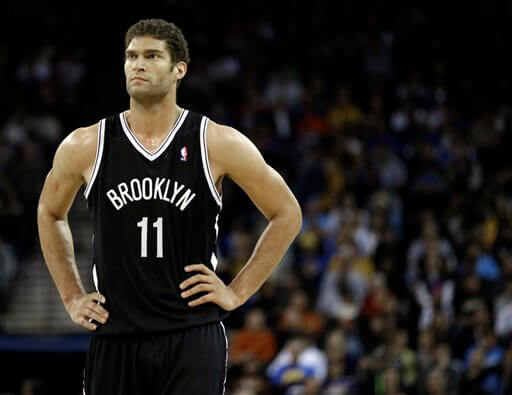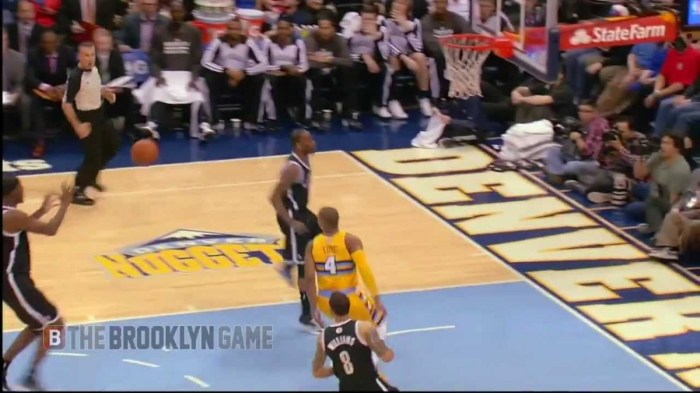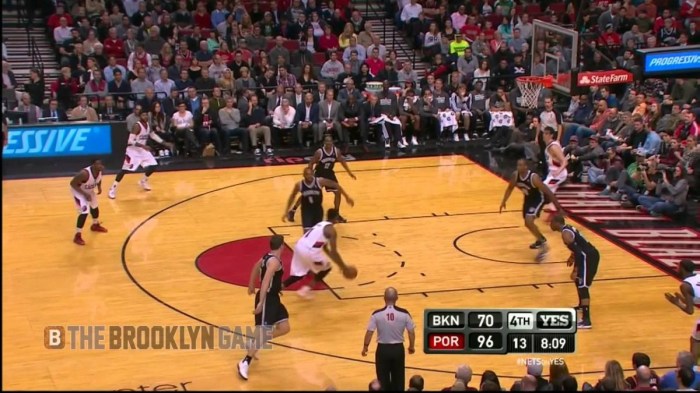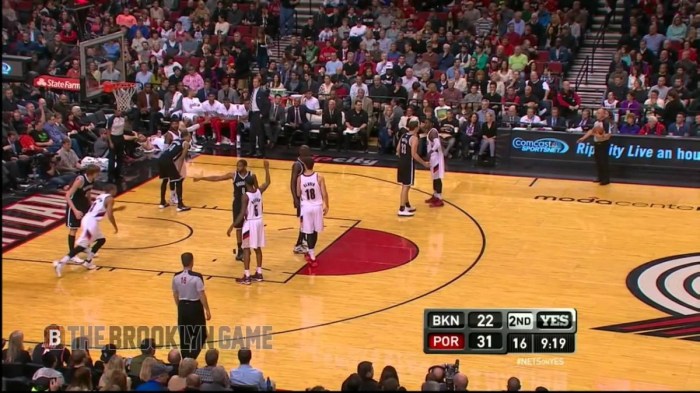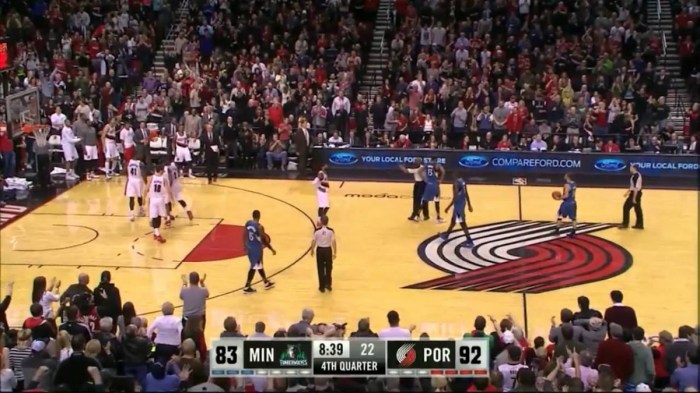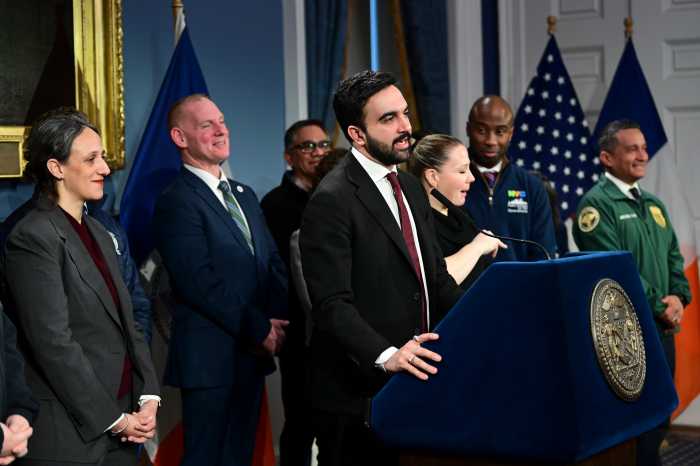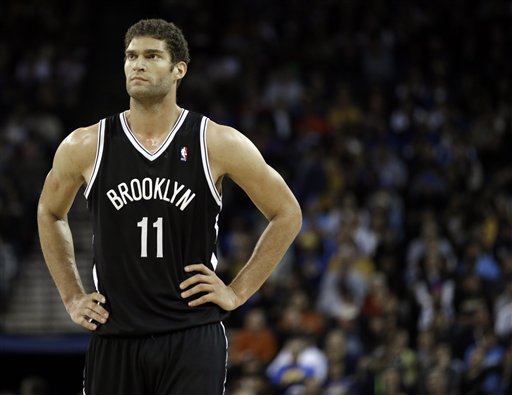
This week, we’re looking back at the series of major decisions that led to the current state of the Nets, and asking you: if you could go back, would you do it again?
These will come in (mostly) reverse chronological order. Today, we cover the moves (and non-moves) that have kept Brook Lopez in Brooklyn.
[poll id=”98″]
The Story: With the Dwightmare definitively over in the summer of 2012, the Nets turned their attention to re-signing center Brook Lopez. As part of a spending spree that saw the Nets add over $340 million of guaranteed salary, the Nets signed Lopez, who played just 5 games in 2011-2012 amid a series of injuries, to a four-year contract worth $61.8 million.
After entering the 2013-2014 season with championship hype, the Nets entered the month of December with a 5-12 record. They were approached by the Lakers, who offered Pau Gasol in exchange for a then-healthy Brook Lopez; the offer was reportedly rescinded once Lopez was ruled out for the season with a broken foot.
The Case for Re-Signing Brook Lopez: Not counting Lopez’s deal, the Nets took on over $275 million in salary commitments in the 2012 offseason, with Deron Williams, Joe Johnson, Kris Humphries, and Gerald Wallace each earning eight-figure annual salaries. The Nets would have been $10 million over the salary cap even without Lopez’s deal[note]Since the Nets owned Lopez’s Bird Rights, they were able to go over the cap to re-sign him.[/note].
Had they let Lopez walk, they would have had to replace him with a minimum-salaried player or an exception. It just does not make sense to let a skilled seven-footer — even one coming off an injury-plagued season — leave for nothing when you do not have the cap room to sign a suitable replacement. Perhaps the Nets could have worked out a sign-and-trade with one of Lopez’s reported suitors, the Charlotte Bobcats and Portland Trail Blazers, but they would have likely received cents on the dollar.
Plus, without him, we’d have no long-running gallery of Brook Lopez faces.
RELATED: The Kevin Garnett-Paul Pierce Trade: Would You Do It Over?
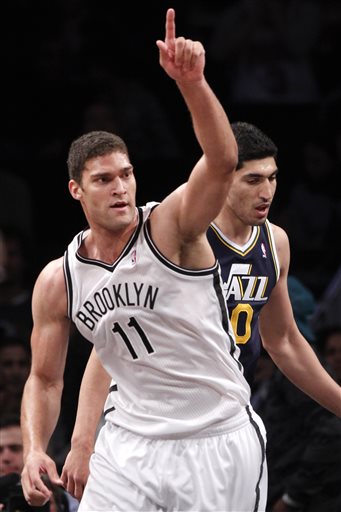
The Nets could have matched the Mavericks’ offer for Chris Kaman (1 year, $8 million), the Lakers’ offer for Jordan Hill (two years, $8 million), or the Warriors’ offer for Carl Landry (two years, $8 million, with an early termination option that was exercised). They could have outbid the Mavericks for Elton Brand (one year, $2.1 million) or the Suns for Luis Scola (three years, $13.5 million) in amnesty auctions. And they could have matched the Pacers’ offer for Gerald Green, who signed a much smaller contract than Wallace (three years, $10.5 million).
None of these moves would have made the splash the Nets wanted ahead of their move to Brooklyn, but it would have given them the cap room to go after the likes of Paul Millsap (who signed a two-year, $19 million deal) and Kyle Korver (4 years, $24 million) the following year. The Mavericks chose to browse the bargain bin after striking out on Deron Williams in 2012, and it proved to be a shrewd long-term play.
RELATED: The Gerald Wallace Trade: Would You Do It Over?
The Case for Trading Lopez for Gasol: Gasol may have been a better fit than Lopez for the 2013-2014 Nets. He is a willing passer: his 20.7% assist rate in 2012-2013 was good for 10th among 128 qualifying big men, while Lopez at 4.8% ranked 123rd. His usage rate that season (19.5%; 38th among big men) was significantly lower than Lopez’s (26.1%; second among big men). On a team of high-usage scorers like Johnson, Williams, Paul Pierce, and Kevin Garnett, Gasol may have slotted in more seamlessly than Lopez. Gasol is also a better defender: while Lopez posted more defensive win shares per 48 minutes than Gasol in 2012-2013, Gasol has bested Lopez in the category every other year.
That, combined with his championship pedigree, may have stabilized the flailing Nets in the midst of their “all-in” season.
The Case for Keeping Lopez: After the Nets mortgaged their future to trade for two past-their-prime stars, it may have been imprudent to trade Lopez, their only piece with upside. At that point, Lopez was a 25-year-old coming off an All-Star season, while the 33-year-old Gasol had posted three consecutive seasons of declining production. There was no guarantee that Gasol, who was a free agent at the end of the 2013-2014 season, would have re-signed in Brooklyn, and clearing his salary from the books would not still not have left the capped-out Nets with much flexibility.
When healthy, Lopez is a special player. In 2012-2013, his PER (24.7) ranked fifth in the league and his win shares per 48 minutes (.191) ranked 13th; he led the 49-win Nets in both categories. He was on pace to improve on those numbers in 2013-2014 before he broke his foot. Despite his slow start to this season, Lopez has recently rounded in to form, and the Nets are at their best when he plays well: over the last four games, all against playoff teams, Lopez has averaged 21.3 points on 50.6% shooting with 7.5 rebounds, 1.5 blocks, and 1 steal. That his hot streak has coincided with the Nets’ best stretch of play this season is no fluke, and that is why the Nets shouldn’t trade Brook Lopez for Denver’s peanuts.
[poll id=”98″]

